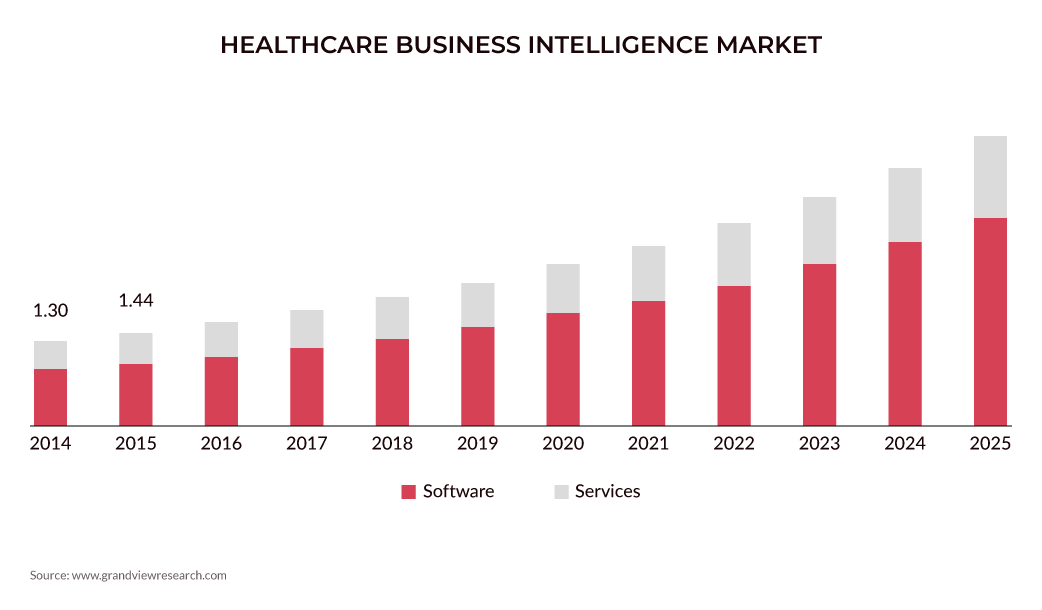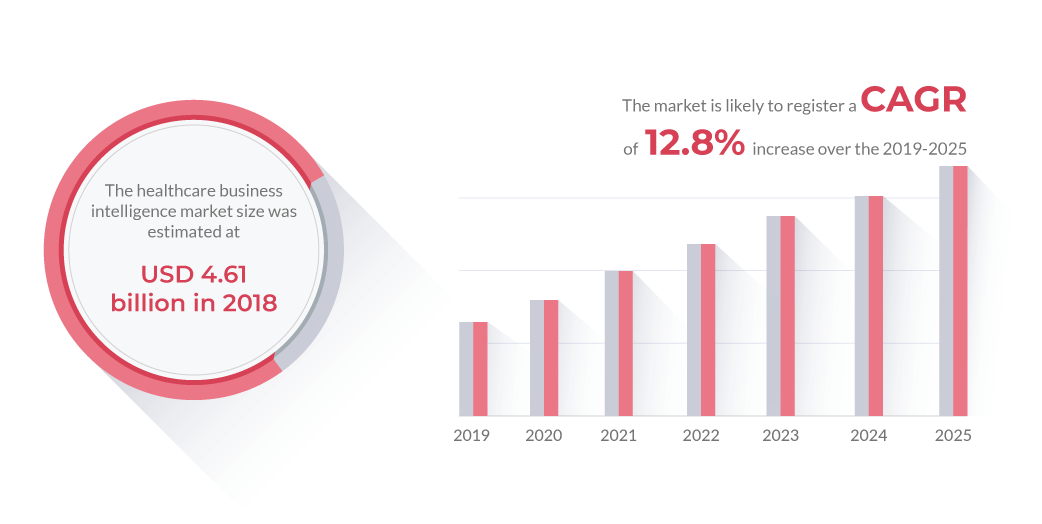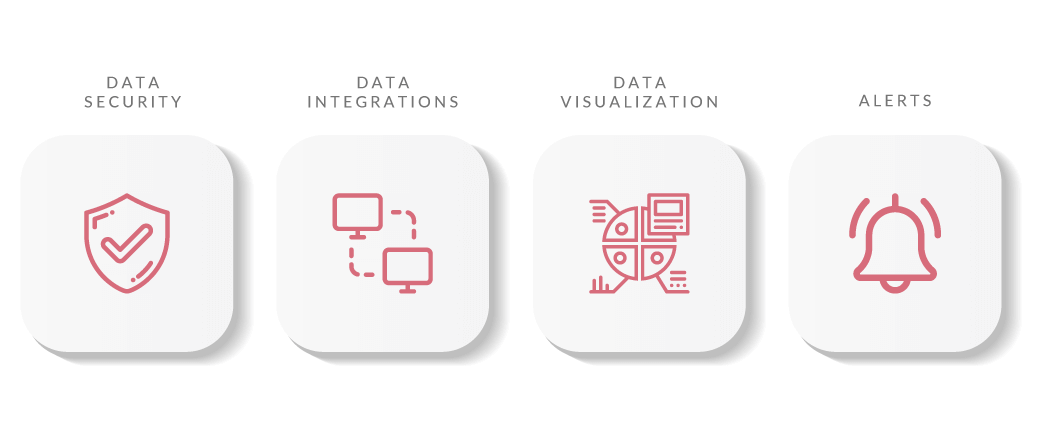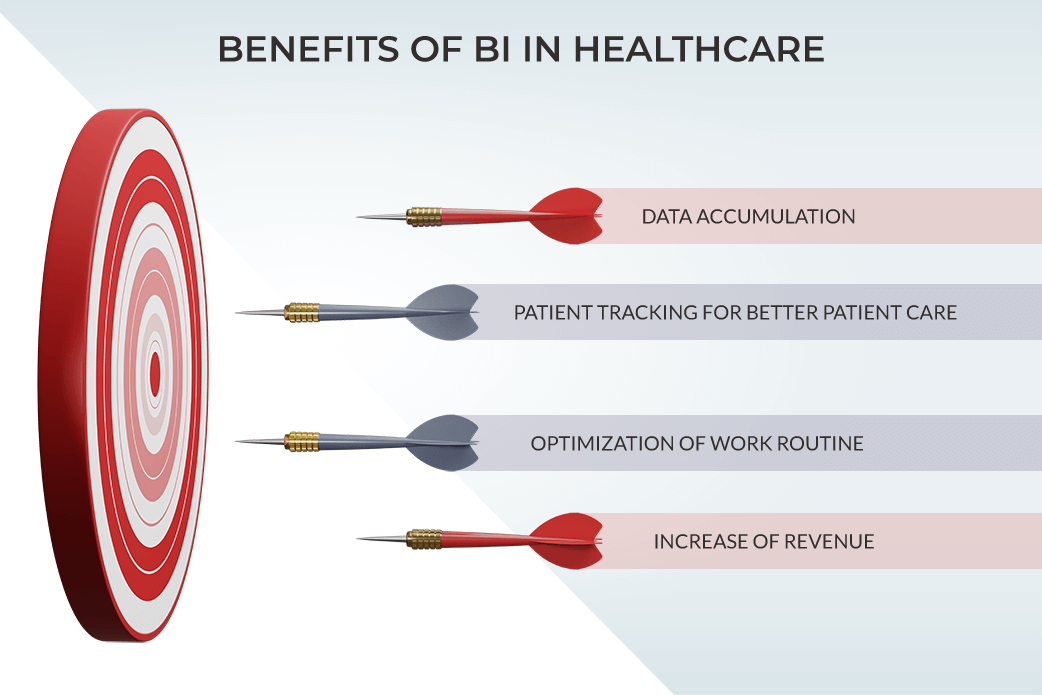4 Important Things About Business Intelligence In Healthcare


Healthcare Business Intelligence Definition and Market Dynamics
Business intelligence in healthcare consists of people, technology, and data (including data extracting, data mining, querying, and reporting activities). All these processes are aimed at:
achieving precise and efficient data analysis related to healthcare service
acceleration of business decisions in the healthcare industry

Due to a host of factors including the need to attain highly optimized operational workflow and respond to the trends of mobility and technological advancement, the importance of business intelligence in the healthcare industry has greatly increased over recent years.
Since healthcare providers strive for enhancing the patient experience and search for ways of having competitive advantages in delivering their service, it is no wonder that the healthcare business intelligence market showed considerable growth.
Business Intelligence prospects in the healthcare market are extremely tempting. The pace of development of predictive analytics and analysis of big data technology allows us to hope for exponential growth. In addition, there is already a need for BI solutions and analytics platforms in the industry.
In particular, according to industry reports, the healthcare business intelligence market size was estimated at USD 4.61 billion in 2018, along with a forecast of a 12.8% increase over the 2019 – 2025 period. The reason behind these dynamics is the increased productivity of the medical professionals, improvement of patient care, and facilitation of medical workforce management. All this became possible thanks to the implementation of business intelligence and analytics solutions in the industry.

Application and features of business intelligence in healthcare
Business intelligence in healthcare takes care of procedural and technical infrastructure, which implies:
Data gathering
Data storing
Data analysis
Healthcare BI software has a functionality that allows tracking information related to patient medical files and history, including financial operations. As a result, healthcare providers can set realistic budgets, deepen patient engagement and use results of data analysis to map a business route free of roadblocks.
BI effectively incorporates multiple categories related to the improvement of healthcare organizations performance, including:
Analytics
Consulting
Field Services
Quantitative Research
Qualitative Research

As for now, business intelligence software for healthcare organizations offers various solutions and ideas to processes listed above by featuring:
Data Security
Having to deal with highly sensitive patient information including finance and health records means a mandatory inclusion of security measures and observance of data compliance (for instance, with the regulations determined by GDPR, HIPAA, and national privacy acts).
Data Integrations
BI software integrates disparate sources and provides timely access to crucial metrics, which means the detailed exploration of patient data from a data warehouse. It enables providers to unassumingly apply this information to improve clinical decisions.
Modern business intelligence software also integrates with electronic health records, EMR systems, and accounting software. It allows healthcare providers to gain a competitive advantage and achieve increased business operational efficiency.
Data Visualization
BI software features interactive dashboards that present data in comprehensive graphs and let us monitor patient care quality, customer satisfaction, medical employee retention, and metrics of productivity. Also, the medical specialist can generate reports, which is critical to the work of business intelligence data analysts.
Overall, the graphic & interactive view simplifies the process of data needs implementation and enables healthcare providers to monitor the operational and financial progress of the organization in real-time. Plus, such a clear view gives medical professionals the means for making data-driven decisions in approving treatment, prescribing medicine, etc.
Alerts
Alerting options in BI tools give users access to systematic notifications regarding meaningful metrics. For instance, medical professionals can easily observe alterations in treatment plans and changes in patient medication history.
In general, business intelligence tools in healthcare imply a wide spectrum of data analytics features, which means that users synchronously get insights into healthcare organizations’ functioning.

Efficient business intelligence software for healthcare can be designed with the following tools:
Cluvio Software
Cluvio belongs to a new generation of cloud-based tools that feature comprehensive interactive dashboards for empowering healthcare companies in terms of efficient data analytics.
Cluvio BI software features filtering and suggesting results within data analysis, as well as displaying data by graphs, charts, and other visuals. As a plus, users can share their dashboards, navigate through SQL editor, and customize alerts. It makes Cluvio suitable to both healthcare providers and medical professional teams of any size.
Sisense
Sisense is an example of a business intelligence tool in healthcare that is created for providing well-distributed accessibility to analytics, data collecting, and visualizing results of data analysis within a single architecture.
It features a special healthcare analytics module that has capabilities for processing queries on big data instantly and, thus, delivering the solution for accelerated decision-making process. Overall, Sisense functionality allows healthcare providers to deliver patient-centric care at best.
Domo
While implementing business intelligence in your healthcare organization, you can give a try to Domo that brings BI leverage fail-safe. It has the capability of predictive analytics by assembling profile data, data science diagnostic, and data cleansing.
It enables businesses to get catered solutions for automating workflows and customizing data experience (for example, by generating relevant healthcare business intelligence reports).
Benefits of business intelligence in healthcare
Business intelligence tools in the healthcare industry bring multiple benefits that we outline below.
Patient Tracking For Better Patient Care
Patient tracking is an integral component of modern healthcare software. It permits medical professionals to access and manage patient data to increase the efficiency of customer experience and ensure positive medical outcomes. BI software makes patient experience tracking as easy as possible since it includes functionality for monitoring:
history of treatment
taking tests
prescription of medicine
patient progress in real-time
Thus, healthcare providers can combine all the stages of their service, bring together data from disparate sources, and design a comprehensive view of patient experience at all stages.
Extension of patient engagement makes a positive impact on treatment outcomes, saves money, and reduces the cost of resource allocation and care. In particular, business intelligence tools provide patients with means of controlling the level of their involvement by accessing and participating in the process directly from the private user dashboard.

Data Accumulation
Healthcare BI software is an effective solution that helps to address the issues of decentralized data storing. Rather than working with inconsistent data, healthcare organizations centralize data accumulation on a single BI platform.
Furthermore, featuring interoperability capabilities, BI tools bring data to a single ‘destination’ and create a data warehouse unifying various sources and enabling healthcare providers to automate data accumulation by removing the burden of manual data import.
As mentioned above, another major benefit of business intelligence software is the ability to integrate information that opens up a myriad of new opportunities for healthcare providers in terms of augmenting the research and clinical data for unlocking more insights.
Optimization of Work Routine
BI solutions and big data analytics software provide lots of actionable insights in predicting patient behavior. For example, it can foretell patients’ missing appointments with doctors and direct healthcare providers in search of effective ways of patient engagement.
Business intelligence software for healthcare helps detect flaws within work routine through real-time monitoring of healthcare metrics of a wide range (from the duration of hospital visit to most frequently used services).
In such cases, healthcare industry improvement with business intelligence stems from more efficient decision-making. It is achieved by admin routine optimization and facilitation of communication across departments of healthcare organizations.
Applying BI solutions in healthcare, medical professionals can achieve specific goals (for example, eliminate tests redundancy) or avoid operational inefficiency by streamlining various work processes (for instance, medical reporting).

Increase of Revenue
Business intelligence and analytics tools in healthcare increase the level of healthcare organizations’ financial operations visibility. For instance, additional cash flow control is one of the technological measures applied for higher profitability.
As it was stated in the McKinsey report, US-based healthcare organizations implementing business intelligence systems can expect to save over $450 billion per year.
It is the result of business intelligence software capability to generate reports on the identified financial patterns and suggest the optimized ways for faster decision making in respect to saving costs, budgeting, and overall profitability.
Thus, by identifying the profitable areas, healthcare companies get the opportunity to concentrate their efforts on cultivating ‘the services of the highest value’, which, in the long run, helps to achieve the best medical results and improve patient care.
As you can see, the benefits of business intelligence in healthcare are a proven fact.
Challenges of business intelligence implementation in the healthcare industry

However, alongside the benefits of the implementation of BI solutions in the healthcare industry, there are some challenges related to building the proper business intelligence strategy. In particular, it is essential to regard the following factors:
Regulations Determining Data Management
Healthcare implies providing security on patient’s highly sensitive clinical data that require special precautions in handling. First of all, it is obligatory to follow the safety protocols and, at the minimal level, correspond to the HIPAA compliance checklist.
Thus, having access to health-related data means that healthcare companies and healthcare service providers must pay special attention to privacy management in terms of information distribution and the safety of data warehouses.
Duplication of Data
Efficient care is based on clinically effective data analytics, which is provided by business intelligence healthcare solutions.
But due to a huge variety of clinical data input from medical professionals, it might be challenging to pull data in a consistent way and avoid its duplicating. In such cases, the solution roots in the domain of seamless data management and its synchronization across all types of data environments.

Bottom Line
Business intelligence in healthcare proves to make a positive impact on both healthcare providers and patients. Multiple examples of business intelligence in healthcare applications confirm the growing trend for healthcare BI market expansion.
With benefits considerably outnumbering the challenges, healthcare providers choose business intelligence tools to cater to their daily data needs, get the means of increasing profitability, and improve patient care thanks to the data-driven approach.
When implementing BI solutions in healthcare, they can either apply the recognized market tools or pick software from professional healthcare business intelligence vendors.
FAQ
Business intelligence in healthcare consists of people, technology, and data (including data extracting, data mining, querying, and reporting activities). All these processes are aimed at:
achieving precise and efficient data analysis related to healthcare service
acceleration of business decisions in the healthcare industry
Business intelligence in healthcare takes care of procedural and technical infrastructure, which implies:
Data gathering
Data storing
Data analysis
Healthcare BI software has a functionality that allows tracking information related to patient medical files and history, including financial operations.
The best healthcare business intelligence tools are:
1) Tableau
2) Diver Platform
3) Power BI
4) Sisense
5) Qlik Sense
Healthcare analytics software helps medics to quickly assess a wealth of data on patient health, patient care and costs. The obtained insights are used by medical specialists to improve patient care, manual processes automation and cost cutting.
Build your ideal
software today

